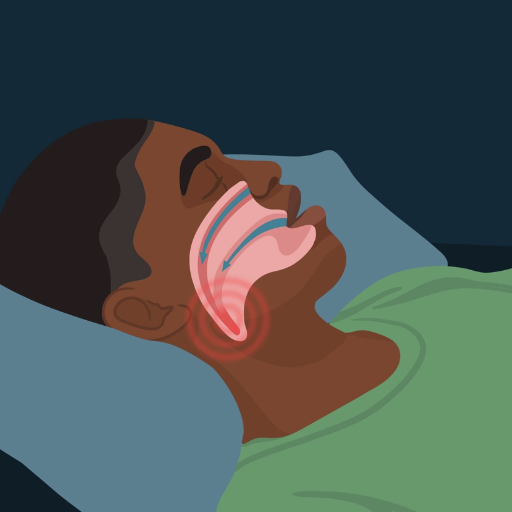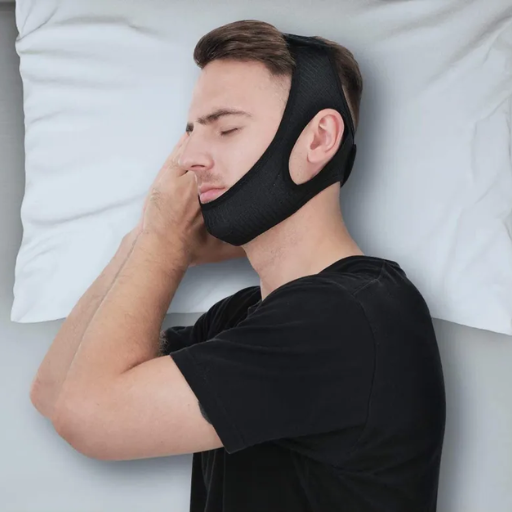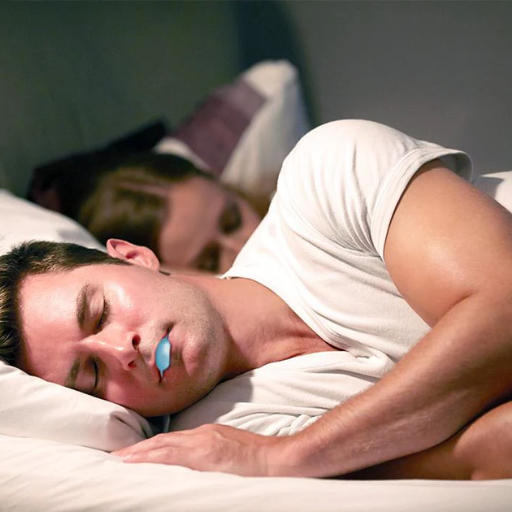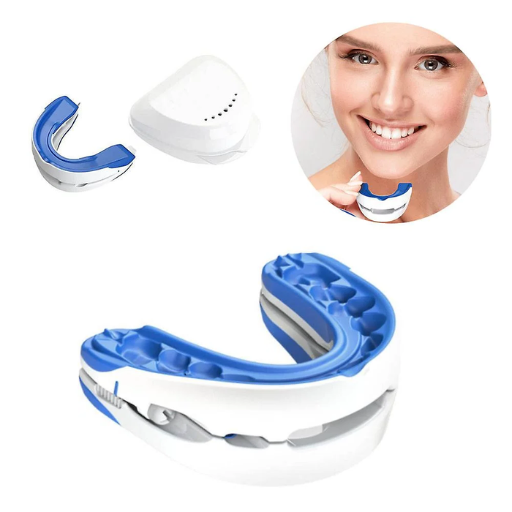There are no reasons to have your sleep disrupted because the health and sanity of those around you matter too. For numerous people, there’s a great need to find a solution that can help in effective sleep and bettering health. This blog post showcases meticulously researched and reviewed some of the most popular anti-snoring mouthpieces and mouthguards available on the market today. Any mouth device whether they’re customizable, cheap, or recommended by doctors, this guide serves the purpose of educating users on what to consider and be to achieve their desired outcomes. From outlining the essential types of devices available for those who wish to eliminate remnants of snoring, to giving practical tips on how to choose and use them, we pore over all the details sought after so that you can enjoy longed-for and well-deserved silence.
What Causes You to Snore?

Snoring manifests when there is a partial blockage of the nasal passage and airflow occurs. The common causes are relaxed throat muscles, nasal congestion, obesity, alcohol use, and even sleeping on your back. Structural causes also include things such as a deviated septum or enlarged tonsils. It is important to find out what the root cause is as it helps in solving the problem easier and faster.
Understanding the Basics of Snoring
Based on the research I have conducted, the reason for snoring is that there is no proper airflow through the airway when someone is sleeping. In my case, it could be because of relaxed throat muscles, nasal congestion, or my preferred sleeping position which is on my back. Other factors include weight, alcohol consumption hours before sleep, and structural abnormality such as deviated septum. To get a solution, the ideal step would be to determine the problem and the sources causing it.
How Does Airflow and Position of the Body While Sleeping Impact Snoring
Airflow of the body is important; as I have learned, an obstruction to the airway could partially cause constriction to airflow and subsequently lead to vibration, which is the primary cause of snores. I often tend to sleep on my back causing inflammation of the throat tissue, which ends up aggravating the situation due to the aforementioned gravity’s contribution. So, when I sleep on my sides or even slightly elevate my body, I can reduce airway obstruction. In addition to these strategies, there are methods I have devised such as allowing myself to breathe through my mouth with the help of strips and a humidifier, which for sure would help in better airflow and subsequently aid in reducing snores.
When to Consult a Sleep Doctor
If snoring is associated with excessive daytime sleepiness, morning headaches, gasping or choking during the night, or high blood pressure, it is time to visit a sleep physician. If someone snores in a loud, persistent manner, with breathing pauses, it might be a case of sleep apnea which requires an urgent professional assessment. Moreover, in case your change of lifestyle practices, such as altering sleeping positions or the use of nasal dilators, have not resulted in any reduction in the snoring intensity, it is best to consult a doctor. A sleep specialist is equipped to conduct a detailed examination, evaluate the patient’s snoring severity, perform necessary sleep studies, and provide specific treatments or interventions needed to resolve the concerns.
How Do Anti-Snoring Mouthpieces Work?

Also called mandibular advancement devices, anti-snoring mouthpieces gently reposition the tongue and lower jaw during sleep which helps to keep the airway open. This adjustment reduces the vibrations within the throat that cause snoring. Some devices can be adjusted to suit each user in terms of comfort and effectiveness. These mouthpieces help many people deal with snoring as a non-invasive solution by preventing obstructions in the airflow passage.
Types of Anti-Snoring Mouthpieces
There are several types of anti-snoring mouthpieces, each designed to address snoring in different ways. As the name suggests, the most common example is the Mandibular Advancement Devices (MDs) that reposition the lower jaw to enable free breathing. THROAT blocking is easily controlled by Tongue Retaining Devices (TRDs), which hold the tongue in an ideal position. TRDs are a great option for patients who are not comfortable with MDs. Furthermore, some mouthpieces are referred to as wide uptake,” meaning they can be molded to fit the user’s teeth, therefore guaranteeing comfort and effectiveness. These appliances are conveniently non-invasive, simple to operate, and effective without the use of surgery or medication.
Mandibular Advancement Device and Its Benefits
MADs, an acronym for mandibular advancement devices, have drastically increased the quality of my sleep by minimizing sleep apnea and snoring. In addition to this, the device gently moves my jaw forward allowing me to breathe unencumbered throughout the night. For me, the most notable features are ease of use, being tailor-made for the customer, and being designed with no surgical techniques required. It is a comfortable, easy-to-use device that alternates for complex solutions like surgery or a CPAP machine. All in all, it was an effective, inexpensive way of treating my fatigue caused by poor sleep quality.
Snoring Relief Effectiveness of Mouth Guards
Mouth guards also referred to as MA(Mandibular Advancement) devices, are effective aids to reduce snoring due to airway obstruction. These devices work by bringing both the lower jaw and the tongue forward thus keeping the throat’s air passage wide open during sleep. They serve a practical and noninvasive means of treatment by stopping the soft structures in the throat from vibrating, thus curing snoring.
Mouthguards constructed by dentists are custom-made to fit any individual’s mouth which ensures comfort and effectiveness. Some are sold for direct use but they are not the most reliable as they can be poorly fitted. Besides the issue of snoring, mouthguards can also be helpful in cases of mild to moderate obstructive sleep apnea as they are a less invasive option compared to CPAP therapy. In summary, these mouthguards represent a cost-effective method for enhancing one’s ability to stay asleep while reducing unwanted disturbances during the night for themselves and their partner.
How to Choose the Best Anti-Snoring Mouthpiece?

- Type – Specify whether you would like to purchase a mandibular advancement device (MAD) or a tongue retaining device (TRD) based on comfort or necessity.
- Customization – Purchase a device that is effective and comfortable for you, don’t settle for pre-made boil-and-bite devices.
- Breathing – If you breathe through your mouth during sleep, get a mouthpiece that has holes to allow airflow.
- Material – Make sure the device is made of high-grade BPA-free materials to avoid irritation or health problems.
- Convenience – select a mouthpiece that is simple to wash and can stand the test of time if properly taken care of.
- Health Issues – You should speak to a doctor about any other sleeping issues, for instance, sleep apnea, before lunging in headfirst.
With all the considerations above, you can pick a mouthpiece that will substantially lessen the amount of noise coming from your throat while ensuring that you are comfortable and safe.
Factors to Consider: Fit, Comfort, and Material
In regards to fit, I try to look for a mouthpiece that is comfortable and feels secure, I also try to avoid devices that will add too much pressure or irritation. For comfort, I look for pieces that have soft materials and will take the form of my mouth so that I can wear them comfortably throughout the night. In terms of material, I try to find options that are BPA-free, hypoallergenic, and durable without being too costly so I can maintain it long term.
Meeting a Dentist or Sleep Doctor for Consultation
My research online was helpful, but I needed direction only a dentist or sleep doctor could provide. The dentist looked at the foundation of my mouth and aligned The mouthpiece for use. In a similar vein, a sleep doctor evaluated my symptoms and determined I would benefit from a mouthpiece to help with my snoring. I appreciate the fact that they were genuine and guided me to a safe and feasible solution that could address my issues.
Comparing Popular Anti-Snoring Devices
After going through the top-rated snoring devices with expert reviews and user feedback, the most common options that I found were: mandibular advancement devices (MADs), tongue-stabilizing devices (TSDs), and nasal dilators.
Mandibular advancement devices work by gently moving the lower jaw forward to keep the airway open. While having moderate or mild snoring problems, this adjustable device tends to be recommended more often. I appreciated the fact that it is adjustable; however, getting used to it overnight might take some time.
Instead of assimilating their user’s tongue, tongue stabilizing devices aim to obstruct the user’s tongue. Unlike other devices, this does not ensure comfort due to a lack of custom fitting, which means that users with diverse dental structures will find it more useful. Even though I consider myself to be one of the many users who do not appreciate their lack of comfort, I can understand their purpose.
Lastly, nasal dilators that aim to minimize the obstruction of airflow tend to make the user’s snoring issue originating from nasal congestion present rather benign. As for my perspective, I found them to be ideal for those people whose problems are mild but not able to deal with other factors.
All devices have their advantages and disadvantages, so selecting the right one relies on individual preference and the reason why a person snores. The knowledge I gained from this analysis, complemented with custom-tailored professional help, assisted in making the decision.
Do Anti-Snoring Mouthpieces Stop Snoring?

Yes, anti-snoring mouthpieces can effectively help stop snoring for numerous people, especially when it stems from an obstruction in the airway caused by the tongue or jaw. These devices work by moving the jaw forward or holding the tongue in a position that keeps the airway open while sleeping. Although most users find them effective, their success is based on the reason for snoring so a healthcare professional should be consulted to see if these devices are appropriate in your case.
Efficiency of Oral Appliances in Dealing with Snoring
In regards to the ease of using these appliances for oral treatment of snoring, I believe that they work best for mild and moderate cases. These devices work by changing the position of the jaw or tongue which aids in keeping the airway open during sleep. As far as my reading goes, their success often depends on the specific cause of the snoring so whether obstruction of the airway is the problem has to be determined. As far as I know, oral appliances are well accepted and for most people who have the problem, the frequency and intensity of snoring can greatly diminish with these devices, but consistent use and proper fitting by a professional is key to gaining the best results.
Success Stories and Reviews
As noted, several people report extraordinary results from the use of oral appliances for snoring. For example, one respondent stated that their chronic snoring was a problem for their partner, but wearing their oral appliance often resolved it so that their quality of life improved greatly. Another success story was that of a patient who had undergone almost every form of treatment without results until their dentist offered an oral appliance, which resulted in decreased snoring within a few weeks. Most reviews focus on comfort and custom fitting, with many people noting the positive impact these devices have had on their health.
Potential Side Effects and How to Manage Them
Oral appliances can help with snoring and sleep apnea, but they do have potential side effects. Among the most reported effects are pain in the jaws, dry throat, excessive saliva, or mild tooth structural change during prolonged use. Some users tend to have a slight bite misalignment temporarily as well, especially in the morning.
So that the side effects are kept at a manageable level, routine check-ups with qualified dental practitioners and sleep specialists are necessary. They may change the settings on the device to improve comfort and fit. Jaw stretches or exercises can help mitigate pain and bite issues. More troublesome concerns like dry mouth and excessive saliva can be dealt with by maintaining proper hydration and oral hygiene. Moreover, if there are indeed more serious side effects like significant pain or shifting of the teeth bones, a professional elimination of the problem can be done to mitigate the issue before it gets worse. Thorough supervision from a credentialed professional with oral appliances can aid reduce the disadvantages that stem exposure and maximize the benefits.
What are the Best Anti-Snoring Mouthpieces and Mouthguards in the Market?

The most effective anti-snoring mouthpieces and mouthguards can usually be divided into two primary categories: Mandibular Advancement Devices (MADs) and Tongue Retaining Devices (TRDs). These include:
- ZQuiet – A soft mouthpiece that boasts comfort while providing several adjustment options.
- Vital Sleep – A customizable mouthpiece that allows the user to lower the jaw for comfort and effectiveness.
- SnoreRX – Adjustable mouthpiece that incorporates micro-adjustments to increase personalization.
- Good Morning Snore Solution – A non-jaw-based approach. This TRD uses a suction tongue design to hold the jaw in a forward position.
- Somnomed – An outstanding MAD that’s commonly dispensed by dentists as it is strong and lasts for many years.
Regardless of these variations, fit, and features differ among the devices and so does the price. Always follow up with a specialist first before buying one to ensure the snoring causes will make it effective.
Top Picks for the Best Anti-Snoring Mouthguards
To find the most effective anti-snoring mouthguards I have analyzed various reviews and feedback. Both The ZQuiet Mouthpiece and VitalSleep MAD were received well by users. The ZQuiet is particularly appreciated for its comfort and ease of use as it doesn’t require molding. The VitalSleep MAD is well regarded for its adjustable jaw position, which makes it ideal for different mouth and snoring sizes. SnoreRx Plus is also highly rated for its custom precalibrated fit that maximizes comfort while providing the most effectiveness. It is very aid to ensure the right mouthguard is chosen so examine these options closely.
Overview of the Good Morning Snore Solution
The Good Morning Snore Solution is classified as a tongue-retaining device(TRD) that attempts to stop snoring by gently retaining the tongue in a fixed position during sleep. It differs from the standard jaw repositioning mouthguard by blocking the tongue from posteriorly falling and restricting the airway. It’s easy to use, comfortable, and even suitable for those with dentures or jaw issues. Uses of different age categories are possible. The clinical trials and quality testing have deemed it a reliable source for stopping snoring.
Picking Out Details for the ApneaRx Sleep Apnea Mouthpiece
The ApneaRx Sleep Apnea Mouthpiece is an apneic device that utilizes a mouthpiece. It is designed to cater to users suffering from mild to moderate sleep apnea. Its adjustment feature is unparalleled. It enables users to customize the device to fit them as accurately as possible. It operates by gently moving the jaw forward. This guarantees that the air passage is adequately opened while sleeping, which considerably reduces snoring and apnea episodes. The device is straightforward to use, can be modified at home, and has clinical proof which increases the credibility and practicality of this device for the multitude of people wanting to treat sleep apnea non-invasively.
References
Frequently Asked Questions (FAQ)
Q: How do I choose an anti-snoring mouthpiece?
A: To choose an anti-snoring mouthpiece, consider factors such as comfort, fit, the severity of your snoring, and whether the mouthpiece is adjustable. Look for options that allow jaw advancement to help find the best fit for your needs.
Q: How do anti-snoring mouthpieces work?
A: Anti-snoring mouthpieces work by holding the lower jaw forward or by stabilizing the tongue, thereby minimizing airway obstruction during sleep. This helps reduce or eliminate snoring and can lead to a better night’s sleep.
Q: Can these devices help with heavy snoring?
A: Yes, many anti-snoring mouthpieces are designed to address heavy snoring by advancing the lower jaw or using tongue-retaining techniques to keep airways open.
Q: Are anti-snoring mouthpieces effective for central sleep apnea?
A: While anti-snoring mouthpieces can be effective for obstructive sleep apnea, they may not be suitable for central sleep apnea. It’s best to consult a certified sleep science coach or healthcare provider for appropriate treatment options.
Q: How long does it take to see results with a mouthpiece?
A: Many users find that anti-snoring mouthpieces can cut down on snoring within 60 days. However, individual results may vary, and some people may experience immediate improvements in sleep quality.
Q: Can using a mouthpiece cause dry mouth?
A: Some users may experience dry mouth when using certain mouthpieces, especially if they are not custom-fitted. Ensuring a proper fit and staying hydrated can help alleviate this issue.
Q: What is the difference between upper and lower trays in mouthpieces?
A: Upper and lower trays in mouthpieces are designed to hold the upper and lower teeth in place. Some mouthpieces have adjustable trays to allow for personalized fit and comfort, which can lead to better sleep.
Q: Are there mouthpieces that can be molded?
A: Yes, some anti-snoring mouthpieces can be molded to fit your teeth better. These custom-fitted devices often provide more comfort and effectiveness in minimizing snoring.
Q: Can mouthpieces help with gum disease?
A: While mouthpieces are primarily designed for snoring, it’s important to maintain proper oral hygiene and consult with a dentist if you have concerns about gum disease when using any oral device.
Q: Do I need to use special pillows with a mouthpiece?
A: While it’s not necessary, using the best pillows that support proper neck alignment can enhance the effectiveness of a mouthpiece and contribute to a better night’s sleep.







